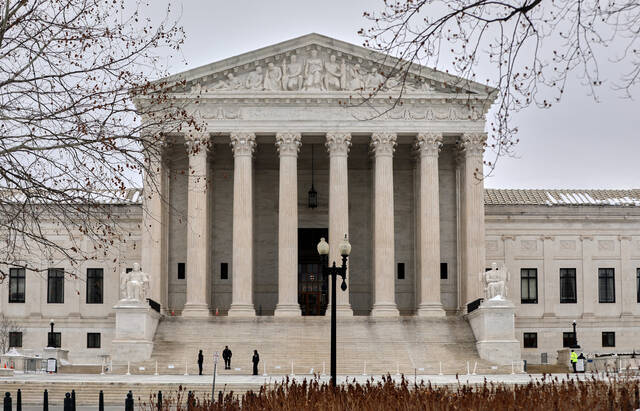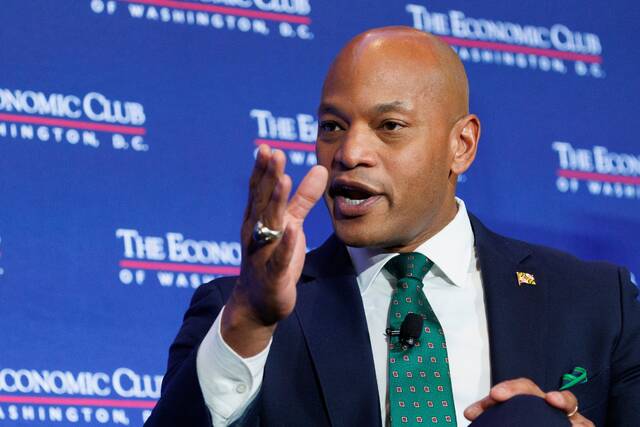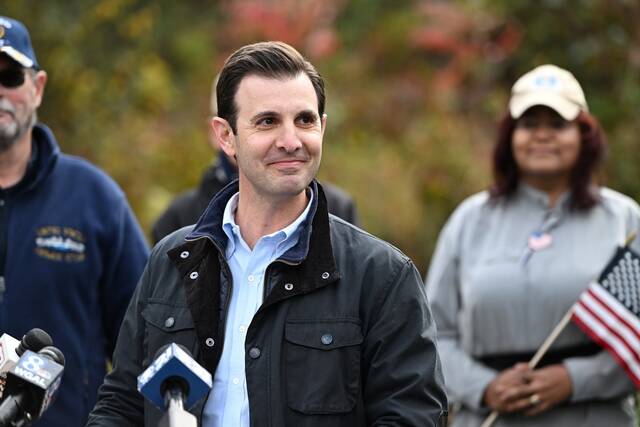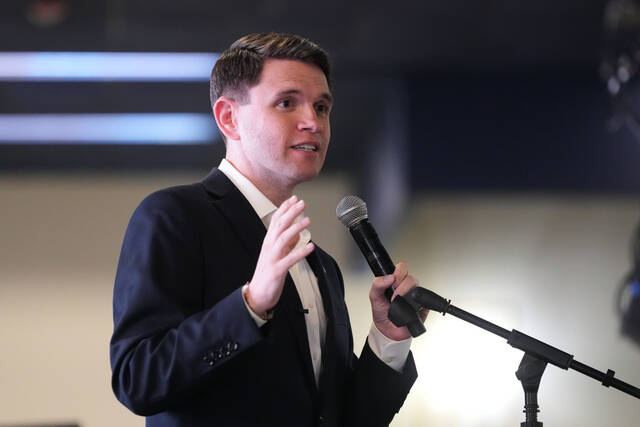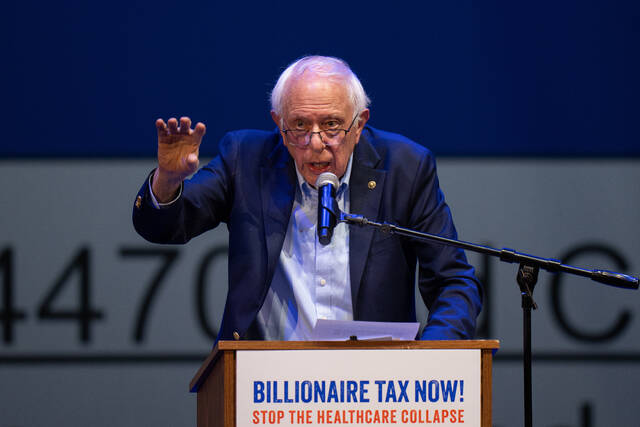As Pittsburgh Mayor Ed Gainey faces a critical primary showdown in May, turmoil has engulfed his administration.
Personnel shakeups, public outbursts, pushback by a newly rebellious City Council — all the drama is making some political observers question whether Gainey may be vulnerable to rival Democrat Corey O’Connor.
Among critics’ examples of dysfunction: the back-to-back departures of Gainey’s two most recent police chiefs, the quiet resignation of his chief of staff without explanation and the ongoing vacancy left when the mayor’s top communications officer quit last year amid controversy.
“It’s not normal at all,” Alison Dagnes, a political science professor at Shippensburg University, said of the high-level turnover. “It’s obvious there’s a significant issue, but also fairly obvious that someone higher up the food chain needs to pay attention and start to solve the problem.”
Dagnes isn’t alone in her assessment. Veteran Grant Street insiders and observers outside Pittsburgh see a city government fractured by disorder and chaos.
“It’s as if the house of cards has fallen down,” said Mike Mikus, a longtime Democratic political consultant. “It’s just incompetence at a level I’ve never seen.”
Mikus spoke to TribLive before the PAC he leads swung its support to O’Connor based on polling that showed the challenger with a significant lead.
The mayor and his supporters — who include major labor unions, progressives and a range of Democratic allies — shrug off criticism as politics as usual.
“I’m very proud of my administration and what they’ve been able to accomplish,” Gainey told TribLive. “The attacks come with it.”
Gainey’s boosters trumpet how the administration reduced homicides and nonfatal shootings, secured $600 million in new investments to revitalize Downtown and advanced a housing agenda focused on helping low-income residents.
But not everyone sees things in such a rosy way.
Several members of City Council, which initially rubber-stamped most of Gainey’s proposals with unanimous approval, are now questioning his spending plans. Some are demanding a more robust public process before voting on the next police chief. And they’ve held up what the mayor’s office had hoped would be a hallmark zoning reform package.
Councilman Anthony Coghill, a Beechview Democrat and frequent foil for the mayor, sees problems everywhere.
“I feel like the mayor and his office are in disarray. It’s really one thing after another,” Coghill said. “There’s so much going wrong in this administration, whether it’s their policies or their spending or the mayor’s comments.”
Gainey has indulged in recent finger-pointing at other elected officials and the media. Last month, he harangued a TV reporter during a news conference. And the mayor, who is Black, labeled Allegheny County’s district attorney, who is white, a racist during a campaign appearance in the Hill District.
The mayor noted his administration has launched several new classes of police recruits after a pause that started under the prior administration. The city attracted the 2026 NFL Draft. And Gainey said he regularly meets with community activists, disputing accusations by some critics that he fails to interact with constituents.
At a recent appearance in the Hill District — the same one at which he lashed out at Allegheny County District Attorney Stephen A. Zappala Jr. — Gainey took credit for improving the lot of minority contractors and creating a diverse cabinet.
“I got so many Black women working in my upper management team, it’s ridiculous,” Gainey told the audience.
Depending on who’s talking, the Gainey administration has either turned into a complete disaster or been an amazing success story.
These competing narratives have emerged as the 55-year-old mayor battles for his political life against O’Connor, a well-heeled and well-known foe who narrowly secured the Allegheny County Democratic Committee’s endorsement.
Gainey dismissed as politically motivated any doubts about his administration’s competence or concerns over its recent departures.
“We’re in political season,” Gainey said in an interview this month. “And in political season, people want to be able to politicize issues in a way to make them feel like they’re doing something heroic when they’re really doing something that is hurting the city. I’m very confident in my administration’s capacity to lead, period.”
Whether Gainey leads Pittsburgh into the future likely will be determined by the May 20 primary. If he wins, odds are he’ll be reelected in November. While two candidates are vying for the GOP nomination, the city hasn’t had a Republican leader in almost a century.
If Gainey loses, O’Connor is almost a sure bet to take over.
‘Stumbles and bumbles’
William Anderson, chair of the Allegheny County Democratic Black Caucus, voiced long-held frustrations that the Gainey administration is not delivering on core city services.
Gainey pledged that this year’s budget would focus on maintaining those services amid fiscal belt-tightening. But a sizable chunk of the city’s snowplow fleet was out of commission during a February snowfall, and the police bureau is losing officers faster than it can replace them.
“It’s a total breakdown of the whole establishment,” Anderson said. “It’s just gotten to a boiling point.”
Anderson also complained, without citing specifics, that the mayor is not responsive enough to constituents.
“It’s a hierarchy that doesn’t hear from the people, doesn’t care about the constituency’s concerns,” Anderson said. “People were looking for change, and we haven’t seen it.”
The mayor disputed that he keeps voters at arm’s length and leaves them out of the loop.
“I’ve been one of the most transparent mayors this city’s ever seen,” Gainey said.
Doug Shields, a former City Council president, said not having a police chief in place ahead of the primary is particularly problematic for the mayor.
Public safety is a key issue, and the quick turnovers at the top of the bureau have raised concerns about stability for a force that struggles to recruit and retain officers.
“You want to have all that nailed down,” Shields said.
Acting Chief Martin Devine has run the 758-member police force since early this month when he replaced Christopher Ragland, who stepped in when Larry Scirotto abruptly resigned in November.
Shields said the struggles to find permanent leadership in the police bureau are emblematic of broader problems.
“There were all kinds of stumbles and bumbles,” he said. “I don’t think they knew what they were doing.”
Jake Pawlak — director of the Office of Management and Budget, deputy mayor and Gainey’s most trusted adviser — agreed that stabilizing the police force is paramount. But he rejected the notion that the Gainey administration is at fault for the recent tumult.
The administration, Pawlak said, considered the need for stable leadership when Gainey tapped Ragland, a three-decade police veteran, for the top spot.
Ragland resigned this month, citing political pressures. He declined to provide specifics about what pushed him away from a job he had long desired, leaving elected officials to point fingers at one another.
“It is a problem,” Pawlak said of the rapid leadership changes in the bureau. “And it is one we want to address, but not one we made.”
Ragland took the helm as acting chief after Scirotto resigned amid controversy over his return to part-time officiating for NCAA basketball games, which took council by surprise.
Gainey’s top officials have publicly acknowledged Scirotto and the mayor had privately agreed to revisit the possibility of refereeing if homicides went down after a year. Publicly, they said Scirotto would give up refereeing altogether while he led the bureau.
Gainey has denied making such a deal.
Upheaval has reverberated elsewhere on the fifth floor of the City-County Building, where Gainey and his top officials work.
Jake Wheatley, Gainey’s former chief of staff, left at the end of January. The mayor’s communications staff alerted the media about the resignation through a statement sent on a Saturday night. Maria Montaño, Gainey’s former communications director, stepped down in August after signing a petition in support of a controversial ballot referendum.
Fueling disorder
Joanna Doven worked alongside Gainey as former Mayor Luke Ravenstahl’s press secretary. Gainey served as a community development specialist under that administration.
Doven, who served on Gainey’s inauguration committee, said the mayor seems to be “constantly running from crisis to crisis.
“Given the fact there’s a significant amount of federal changes that will no doubt impact cities and metros in terms of their ability to deliver services, also having city government in disarray couldn’t come at a worse time,” Doven said.
Eric Epstein, founder of good government group Rock the Capital, said the Gainey administration’s recent woes erode public trust.
“The mayor is an extension of the prevailing political culture where chaos is king,” Epstein said.
Some have said Gainey’s recent public comments — questioning why the media doesn’t report more positive stories, accusing council members of inappropriate politicking and calling the district attorney a racist — fuel a sense of disorder.
Zappala has gone after Gainey and his predecessor, Bill Peduto, for their approaches to public safety. The DA has blamed both men for what he believes is a crumbling sense of security Downtown.
In response to Gainey’s comments, Zappala’s office issued a dismissive statement.
“The district attorney has too many important matters to be distracted by the mayor’s failing administration; and apparently a badly failing campaign,” Zappala’s office wrote.
Gainey did not cite any specific actions that triggered his attack, but he told TribLive, “I stand by what I said.”
Zappala’s office executed a search warrant on the city last year after Parks and Recreation Director Kathryn Vargas improperly used a city credit card to pay a contractor who was later charged with an unrelated crime.
The district attorney’s investigators alleged city leaders initially denied access to relevant materials.
Pawlak told reporters there was “no basis of a criminal investigation.”
Rowing all together
The Gainey administration has struck a confident tone despite the city’s declining revenues and questions about whether the city will be able to maintain its 2025 spending plan.
“We’ve created a pretty powerful group of people rowing the boat in the same direction,” Chief Operating and Administrative Officer Lisa Frank said.
She, Pawlak, Chief Financial Officer Patrick Cornell and Kyle Chintalapalli, the city’s chief economic development officer who doubles as the new chief of staff, have been in Gainey’s corner since the earliest days of the administration.
Frank and Pawlak said the focus should be not on the high-profile departures or political controversies but on the administration’s deeds.
Under Gainey, the city launched its first in-house EMS training academy. In cooperation with the county, it has undertaken a more proactive approach to moving people from homeless camps to indoor shelters. According to Chintalapalli, more than 1,400 affordable housing units are under construction or have been completed during Gainey’s tenure.
“I think that’s a testament to the strength and continuity of the staff that we’ve had,” Chintalapalli said.
He argued that high-stress positions like chief of staff and police chief aren’t always conducive to long-term tenures.
“These are high-demand jobs, and they have a shelf life, if you will,” he said.
Labor support
Several of the city’s largest, most active unions have rallied behind Gainey.
Steven Kelley, SEIU Local 32BJ’s assistant district leader for Western Pennsylvania, said he plans to campaign for the mayor.
“He became mayor during a crisis and has worked tirelessly to rebuild Pittsburgh,” Kelley said.
He highlighted Gainey’s support of a tax abatement to spur conversions of vacant Downtown offices to affordable apartments, and of public safety initiatives aimed at making Downtown safer.
Matthew Yarnell, president of SEIU Healthcare PA, applauded the mayor for his ongoing efforts to force the city’s biggest nonprofits to pay taxes or payments in lieu of taxes, even though the strategy hasn’t generated as much revenue as hoped.
Over the past three years, the city has won just over $294,000 by challenging the tax-exempt status of billion-dollar nonprofits. The Gainey administration estimated it could have raked in $3.5 million had it won all its challenges in the first round officials announced.
“Ed has stood up to the largest so-called nonprofits in the city,” Yarnell said.
Rich Schiavoni, president of the local United Steelworkers union, credited Gainey for improving conditions for workers throughout the city. Gainey launched the Office of Equal Protection, which enforces labor laws, while ensuring civil and disability rights are protected.
“Mayor Gainey stood with workers of all backgrounds as we fought for fair treatment on the job, for a better future for our families and our community,” Schiavoni said.
But some career civil servants and political observers have raised concerns about how effective the Gainey administration can be in light of recent incidents.
“The chaos just breeds a lack of confidence by the constituents,” said state Sen. Wayne Fontana, D-Brookline, who is chairman of the Sports & Exhibition Authority.
Who’s to blame?
City leaders are divided on who’s to blame for recent upheavals.
Councilwoman Barb Warwick, D-Greenfield, said Ragland’s departure and the political finger-pointing are the fault of some of her council colleagues, not the mayor.
“I think it’s very concerning that members of council worked together to delay a nomination of a 31-year police veteran who really, really wanted to do the job of chief,” she told TribLive. “And, basically, they did everything they could to chase him off. It may be a political point for them, but it is a major loss to the people of Pittsburgh.”
Coghill, who has been involved in Pittsburgh Democratic politics for at least 15 years, put the onus on the mayor.
Morale on Grant Street, the councilman claimed, is “at an all-time low.”
Gainey’s political opponents are seizing the opportunity to attack his administration.
“It shows there’s dysfunction,” O’Connor said of the high-level departures. “It shows nobody wants to be part of this administration anymore. We deserve people that are committed to working in the city of Pittsburgh.”
Tony Moreno, a former Pittsburgh police officer running as a Republican mayoral candidate, sees the Gainey administration as detached.
“They are so completely shut out of the community they are governing over,” he said. “They are so disconnected. They don’t know what’s happening on the street.”
Thomas West, a Highland Park businessman competing against Moreno on the GOP ticket, criticized Gainey for controversies and the turnover at police chief.
“Public safety is a core function of government, but instead of working alongside our chief law enforcement officer, Ed Gainey is hurling baseless attacks at the district attorney and local media to take the spotlight off of the shortcomings and incompetence of his leadership,” West said.
Navigating a ‘tempest’
How these concerns impact the upcoming primary is up to voters, political experts noted.
Some turnover is not unusual and may be too inside-baseball for average voters to care, said Berwood Yost, who oversees polling at Franklin & Marshall College in Lancaster.
But the presence of a strong primary challenger may be a bad sign for Gainey, he said.
“Primary challenges normally signal that an incumbent is not viewed positively, or is viewed as weak, by his own party members,” Yost said.
Chris Borick, a political science professor at Muhlenberg College in Allentown, said running a major city is always a challenge that will inevitably come with setbacks and resignations. How the public perceives the mayor’s response is what matters most on Election Day.
“From my vantage point, the mayor seems to find himself fairly regularly in what might be described as a tempest,” Borick said. “When you’re in a tempest and trying to steer your way out, you look for strategies that will help you do that. I think looking at laying blame elsewhere, targeting individuals that you think are worth negative attention, is not unusual.
“You’re going to confront lots of obstacles. How you handle them is key in terms of how the public’s going to view you for a reelection campaign.”
Sal Sirabella, who served as former Mayor Tom Murphy’s deputy, said he is not convinced Gainey’s prior experience as a state representative prepared him to step into the role he now holds.
“State representatives don’t do anything unless you get into leadership,” Sirabella said. “He didn’t have any background in what was going on. They don’t have police forces. They don’t have public works crews.”
Some political observers believe the mounting pressure around the election and compounding problems in City Hall are affecting the mayor. Dagnes, the Shippensburg professor, said it’s not unusual for elected officials to feel extra strain around elections.
A case in point: Gainey pestering a TV reporter last month during a news conference, demanding he thank Ragland for his work in keeping the city safe — and not being satisfied when the reporter didn’t address Ragland as “chief.”
Sylvia Wilson, a Democratic ward chair in Pittsburgh and city school board member, said she thought Gainey may have been growing frustrated with negative news stories over Downtown safety, a prickly subject for the mayor. Reporters had covered a shooting blocks away from the location of that Downtown news conference the day before.
“You have to respond (to news coverage) and say, ‘Enough is enough,’ ” Wilson said.
Regardless of what others may say, Gainey told TribLive that he believes his administration is on the right track.
“We’ve done a good job,” he said. “There’s no question we’ve done a good job.”
However Gainey rates his performance, voters will render the ultimate verdict.
Samuel Chen, principal director at political consulting firm The Liddell Group, believes they are taking notice of what’s happening in Pittsburgh politics.
“With the mayor coming into an election year, you can say everything is fine,” Chen said, “but the voters are raising eyebrows.”



